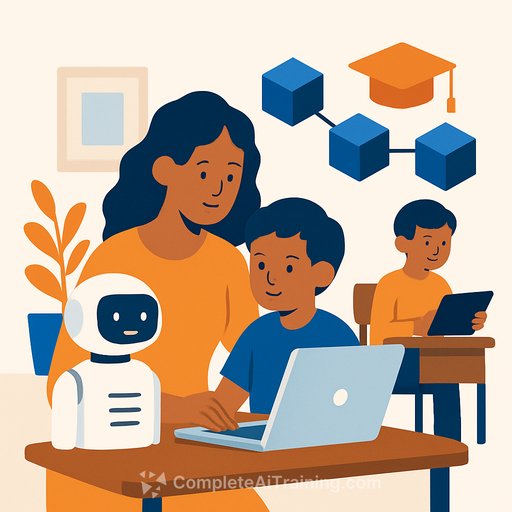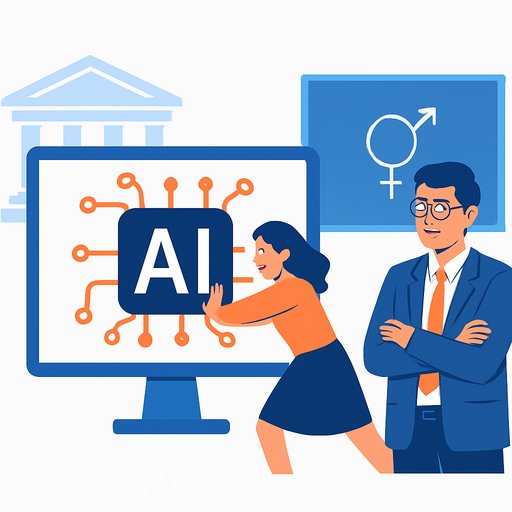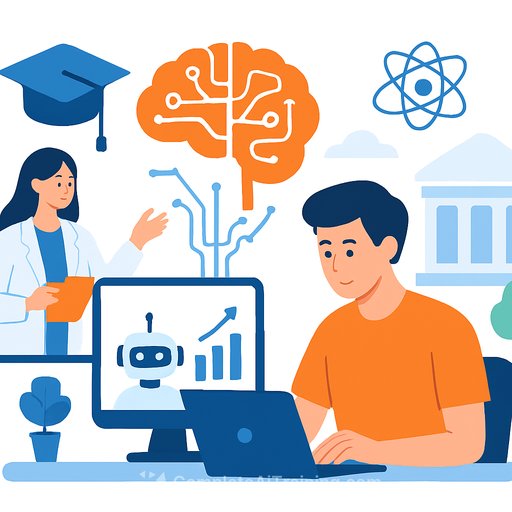New AI Education Leaves No Parent/Child Behind As Blockchain Ed Grows
Schools are producing curious students. Employers need AI- and blockchain-fluent hires. The gap between those two facts is where districts, principals, and teachers now operate.
Families are the missing link. If parents feel confident, adoption in classrooms gets easier, and students build durable skills. Two moves point the way: DISCOVERING AI's FAMILY AI GAME PLAN™ and state-level blockchain programs like Wyoming's WyoBEE.
The skills gap is here
- 26% of hiring managers now treat AI fluency as a baseline requirement.
- 65% say AI-related skills are very or extremely important for competitiveness.
- Jobs requiring AI skills are growing ~7.5% year over year.
- AI roles deliver wage premiums averaging ~56%.
These are no longer "bonus" skills. They are table stakes for career paths across subjects and industries.
A practical playbook parents can use (and schools can support)
The FAMILY AI GAME PLAN™ (launching Sept 24) gives parents a simple framework to review school AI policies, audit how AI shows up in homework and entertainment, and set evolving boundaries. The guidance encourages regular family check-ins so rules keep up with the tools.
Amy D. Love, founder of DISCOVERING AI, put it plainly: "Parents can't sit on the sidelines. We've already learned that lesson with social media... The FAMILY AI GAME PLAN gives parents a starting point to connect technology to their values, ask the right questions, and set evolving boundaries together."
For schools, this reduces friction. When families feel in control, they're more open to classroom use of AI, which supports teacher adoption and student outcomes.
A national event to kick this off
The plan debuts at the free, virtual DISCOVERING AI National Back to School Game Plan Discussion. Parents will see tools like ChatGPT Study and Learn and Google Gemini Guided Learning in action, plus try hands-on activities like MindSpark. Breakouts will help families build their first Game Plans live.
Registration: DISCOVERING AI Back-to-School Game Plan Discussion
Grounding AI in values and ethics
The most useful part of the FAMILY AI GAME PLAN is its values-first design. It links AI use to family principles. Parents model healthy work use. Kids set goals for creativity, problem solving, and quality.
AI ethics is built in. As Marisa Zalabak, Co-Chair IEEE AI Ethics Education, explains: "AI Education and AI Ethics Education are desperately needed... the dangers grow daily when powerful tools continue to go without guidance." Tools that support family values, provide transparency, and include oversight will earn trust. Those that ignore expectations will face pushback.
Global context: education systems are moving
Singapore and South Korea have national AI curricula. Denmark connects AI, ethics, and workforce development. Finland's public course has spread internationally.
Want a reference point to share with staff or parents? Finland's public course is here: Elements of AI.
Blockchain education is catching up
AI isn't the only focus. Blockchain impacts finance, identity, and ownership. Wyoming's WyoBEE (Wyoming Blockchain Education for Everyone) provides twelve modules for high school and community college students, complete with games, teacher manuals, quizzes, and NFT certificates of completion. Senator Cynthia Lummis captures the urgency: "Digital assets ARE the future. We either embrace them, or we lose."
- WyoBEE: a full course stack (modules, assessments, credentials).
- Everfi: Crypto Foundations for high schoolers.
- American Council on Education: Education Blockchain Initiative.
- Circle U: literacy programs at HBCUs.
What's missing today is a family-level blockchain playbook similar to FAMILY AI GAME PLAN™. That's an open lane for states and districts.
What schools can implement this semester
- Host a Family AI Night: Introduce the FAMILY AI GAME PLAN™; run short demos of classroom-safe AI and guided practice for parents and students.
- Publish a clear AI use policy: Define where AI is allowed, where it's restricted, and the review process for exceptions. Include model prompts and citation rules.
- Start with three anchor use cases: Study plans, reading support, and project brainstorming. Provide rubrics that separate student thinking from AI assistance.
- Embed micro-lessons on ethics: 10-minute weekly discussions on bias, privacy, and attribution. Align with digital citizenship standards.
- Teacher PD that sticks: 90-minute workshops with classroom templates, parent letters, and assessment examples. Follow up with office hours.
- Pilot a blockchain module: Credential basics, wallets, and identity. Use formative checks and a simple credential at the end.
- Measure and report: Track adoption, student output quality, plagiarism incidents, and parent sentiment. Share wins and adjust.
Why this matters for budgets and partners
EdTech is forecast to grow at a 13.3% CAGR from 2025-2030, reaching about USD 348.41B by decade's end. But spend does not equal success. Families are the gatekeepers of trust. Districts can buy tools; households decide acceptance.
Frameworks like FAMILY AI GAME PLAN™ and programs like WyoBEE act as adoption infrastructure. They make classroom use credible, support teachers, and build a stronger talent pipeline for local employers.
Quick resources
- DISCOVERING AI Back-to-School Game Plan Discussion (free)
- Elements of AI (public course)
- Complete AI Training: Courses by Job (PD pathways)
No parent or child left behind
Students want AI skills now. Without guidance, curiosity turns into confusion and risk. With a simple family framework and credible school programs, you get confident learners, aligned parents, and teachers who can focus on instruction instead of policing tools.
Start with one family night, one policy update, and three classroom use cases. That's enough to change momentum this term-and set students up for the age of AI and blockchain.
Your membership also unlocks:






